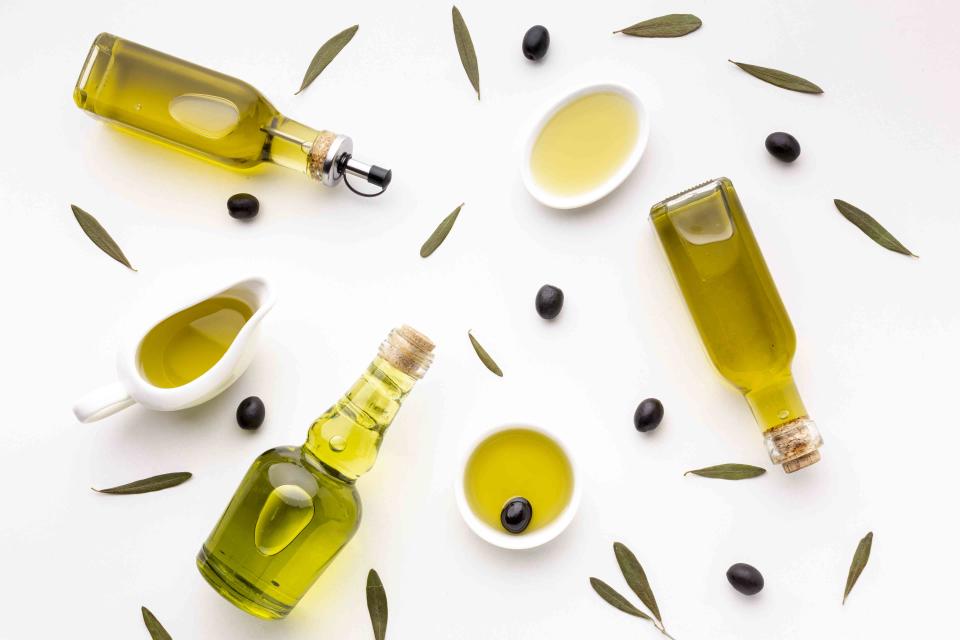Does Olive Oil Go Bad? Here's What You Need to Know
The pantry staple doesn’t last forever.

Petra Olteanu/Getty Images
As far as cooking fats are concerned, olive oil is the “it girl” of the pantry. Not only is it prized for its fabulous flavor, it’s immensely versatile, as handy for sautéeing spinach as baking cakes. Olive oil is also brimming with health benefits, particularly when you reach for the extra-virgin variety. But, does olive oil go bad?
Indeed, olive oil (or any oil for that matter) is not immortal. It’s an agricultural product, after all, the “juice” from the fruit of olive trees. Over time, light, heat, and oxygen break down the oil, causing it to go rancid. That impacts both taste and nutrition—the two primary reasons to pay up for good olive oil. So, if you don’t want to ruin a perfectly good plate of pasta or diminish all those powerful phytonutrients, take care of your olive oil (and toss it if it’s no good).
Related:Yes, You Can Cook With Olive Oil Over High Heat—Here's Why

Petra Olteanu/Getty Images
How to Tell If Your Olive Oil Has Gone Bad
Just like you might sniff a carton of milk to see if it has soured, your nose is your best friend when assessing olive oil. Start by giving it a good whiff (it may help to pour a glug into a small glass first). If you’re still not sure, take a sip. Don’t worry, it won’t make you sick. “If the oil tastes or smells like stale nuts, wax crayons, old lipstick, Play-Doh, or off meat, and leaves you with a fatty and waxy mouthfeel, the oil is likely rancid,” says Leandro Ravetti, Joint-CEO of Cobram Estates olive oil. “If it doesn’t remind you of something fresh and fruity, the oil is likely off.”
Can You Use Expired Olive Oil?
Small amounts of expired olive oil won’t do any harm, but some research suggests that having rancid oil in regular rotation could have health consequences over time. “When an oil oxidizes and goes rancid, the healthy fats in extra-virgin olive oil start breaking down, and free radicals start to form. Free radicals are effectively the opposite of an antioxidant, and can cause damage within our body,” says Ravetti.
Related:Olive Oil Is About to Get Very Expensive—Here's Why
How Do You Prevent Olive Oil From Going Bad
Preventing oil from going bad starts at the supermarket. Bulk-buying may seem like the economical choice, but not if you end up having to throw it out. Ravetti recommends buying a bottle that you are likely to get through in four to six weeks. It’s also wise to skip oils packaged in clear containers, since light isn’t your friend when it comes to longevity. Instead, opt for olive oil bottles that are made of dark glass, which will protect the oil from sunlight and extend its shelf life. Once you have your oil home, store it in a cool, dark place, located away from the stove.
Should You Refrigerate Olive Oil?
Storing olive oil in a pantry should do the trick in most cases, but if you simply don’t have a cool enough spot, the refrigerator may be an option. Just know that olive oil solidifies as it chills. Pull the oil out of the fridge a half hour or so before you need to use it. Alternatively, you can dispense a smaller amount to keep at room temperature, and stash the rest in the fridge.
Related:6 Things to Always Avoid Doing With Your Olive Oil
What Should You Do With Expired Olive Oil?
What’s most important here is that you don’t dump olive oil (or any cooking oil for that matter) down the drain. It will clog your pipes! Rather than waste it entirely, consider moving it from the food pantry to the cleaning supply closet. It can be used to condition leather, polish wood, or give some shine back to your stainless steel.
For more Real Simple news, make sure to sign up for our newsletter!
Read the original article on Real Simple.

